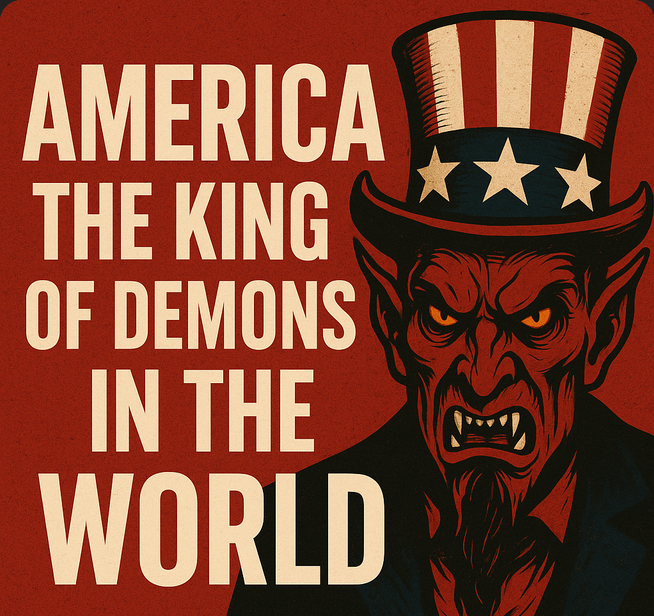In the shadowed corridors of global politics, where power supersedes morality and strategy often buries truth, one nation has stood atop the mountain — cloaked not in righteousness, but in dominance. For critics of U.S. foreign policy and global influence, the title is darkly fitting: America, the King of Demons in the World.
The Empire of Contradictions
The United States has long proclaimed itself a beacon of democracy, freedom, and human rights. Yet, its actions abroad often betray its stated ideals. From orchestrating coups to supporting dictatorships, America has repeatedly intervened in sovereign nations under the guise of “spreading democracy” — often leaving behind chaos, civil war, or puppet regimes.
Iraq. Libya. Vietnam. Afghanistan. The names are more than warzones — they are monuments to a pattern of interventionist policies driven by economic interests, control of natural resources, and global dominance. Civilians suffer, infrastructures collapse, and generations are scarred — but defense contractors and oil companies thrive.
War as Business
America's military-industrial complex is perhaps the most literal manifestation of modern-day demonic power: a system where war is profitable and peace is a threat to business. With over 750 military bases in more than 80 countries, and trillions spent on warfare since 9/11, the U.S. maintains a global grip that transcends mere defense — it's empire in everything but name.
While American media often paints these actions as protective or peacekeeping, to many around the world they represent the iron fist behind a velvet glove — a self-appointed enforcer that operates above international law.
Cultural Colonization
The domination isn't only military — it’s cultural. Through Hollywood, tech monopolies, and consumer culture, the U.S. exports a lifestyle that replaces local identities. Traditional values erode under the weight of hypercapitalism and mass media, often welcomed by youth but lamented by elders. The soft power of American culture, while mesmerizing, is viewed by critics as another form of control — not by bombs, but by branding.
Hypocrisy and Double Standards
America’s condemnation of human rights violations abroad rings hollow when juxtaposed with its own record: systemic racism, mass incarceration, surveillance capitalism, and a healthcare system that bankrupts its citizens. At the UN and other forums, it often positions itself as a global moral authority, while ignoring international rulings or refusing to sign treaties that limit its power.
Demon or Giant?
To call America a “king of demons” is, of course, deeply metaphorical — a reflection of anger, fear, and frustration shared by communities and nations who have borne the brunt of its policies. To others, America remains a land of opportunity and innovation. The truth, perhaps, lies between extremes — a nation capable of great good, yet haunted by its darker ambitions.
In the eyes of many, America is not a guiding light, but a shadow — a superpower whose influence feels more imperial than inspirational. Whether one views it as protector or predator, liberator or leviathan, one thing is clear: America's role in the world is not benign. It is powerful, strategic, and often ruthless.
And for those who have suffered under its weight, the title stands not as exaggeration — but as testimony: the King of Demons in the modern world.






